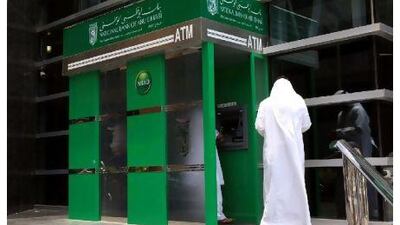Shareholders at the UAE's largest banks received healthy payouts in a show of confidence by bank managements that suggest they believe the worst of the financial crisis has passed.
In the past few weeks, National Bank of Abu Dhabi (NBAD), First Gulf Bank and Mashreq have approved large dividends.
A number of banks cut dividends during the global financial crisis, but analysts read an increase in dividends as a good signal about profits.
"Typically, high dividends shows confidence in the future," said Jaap Meijer, a financial analyst at Alembic HC Securities. "During the crisis, sometimes banks needed to protect their capital base [by reducing dividends]. When the going gets tough, it would have been more prudent to reduce the dividends, but banks were reluctant to do so."
On Sunday, NBAD approved a cash dividend of 30 fils per share, totalling Dh717 million (US$195.2m), and approved a 20 per cent increase in bonus shares. Net profit for last year rose 21.9 per cent to Dh3.68 billion compared with 2009.
The majority of the payout went to the Abu Dhabi Investment Council, which has a 70.48 per cent stake in the bank. The dividend last year consisted of a 10 per cent increase in shares via an issuance of bonus shares and a 10 fils per share cash payment.
The lender joined First Gulf Bank, which last week approved a cash dividend of 60 fils per share, totalling Dh900m, and a 5 per cent increase in bonus shares, according to regulatory filings.
The bank reported a 3 per cent increase in profit to Dh3.42bn last year, when it awarded a 50 per cent cash dividend, compared with the year before.
Meanwhile, Mashreq awarded a cash dividend of 20 per cent of profit, having booked Dh803m of profit for last year, down 21.4 per cent from Dh1.06bn in 2009, when it paid a 15 per cent cash dividend and a 5 per cent increase in bonus shares.
Banks on the whole are in a good position to pay dividends, having raised capital adequacy ratios over the past year, Mr Meijer said.
"Liquidity positions have improved a lot in 2010 [and] the UAE banking sector is looking healthier." However, credit growth remained slow for much of last year. In January, net loans and advances rose 2.78 per cent to Dh1.04 trillion from the same time last year, according to the most recent data from the Central Bank.
Mark McFarland, an economist at Emirates NBD, said that with the outlook for the economy improving, banks ought to be in a stronger position to lend. "While we've not seen a significant upswing in credit growth, over the next 12 months we should start to see credit growth improving, because the oil sector is experiencing such a rapid increase in revenue," he said.
"The outlook in the short term is still quite weak, as the Central Bank data show.
"But in the longer term, with rising oil prices, there's going to be a more liquid market."
Michael Tomalin, NBAD's chief executive, said the bank's "low loan growth in 2010 was not a result of lack of availability of funds".
"It was more reflective of the slower pace of growth in the UAE economy and hence the lower demand plus some repayments in the fourth quarter," he said. "The bank believes in maintaining a healthy dividend policy."
A spokeswoman for First Gulf Bank said the lender was suitably positioned to finance payouts. "The bank maintains a balance between declaring higher cash dividends and also retaining enough funds for future growth," she said.
Elsewhere in the Gulf, however, even higher payouts are commonplace.
In January, Qatar National Bank's board approved a cash dividend of 50 per cent of share capital and bonus shares equivalent to 30 per cent of share capital.

